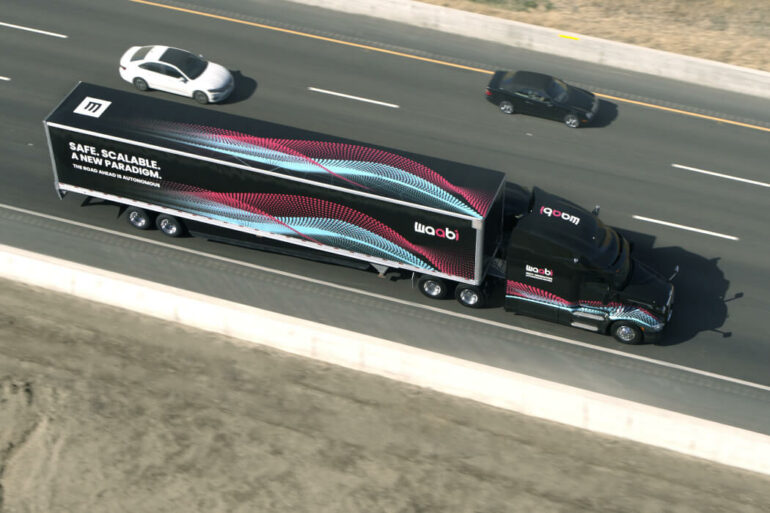Waabi, the Toronto-based autonomous vehicle (AV) startup led by artificial intelligence (AI) luminary Raquel Urtasun, has unveiled the Waabi Driver, its self-driving tech product.
According to Waabi, the Waabi Driver will soon hit the road for testing, and offers “unparalleled safety, scalability, and flexibility” compared to its competitors. Waabi has set its initial sights on autonomous long-haul trucking, as the firm looks to help the industry address its labour shortage and ongoing supply chain woes.
The Waabi Driver reveal comes during what Urtasun called a “winter of AV.”
The reveal of Waabi’s first product comes during what Urtasun described as a “winter of AV” after years of limited to slow progress on self-driving tech development that has seen significant players and billions in stock market value wiped out.
“We’ve seen some companies go down, some of the big companies, and that’s obviously sad,” Urtasun told BetaKit in an interview. “But what we see is a realization that what I call the previous generation of technology is too capital-intensive [and] too far from solving the problem. With an economy like today, it’s impossible to continue that burn rate of half a billion, a billion, two billion [dollars], or whatever it is for some of our competitors.”
In the midst of these conditions, Urtasun believes the time for a new approach is now. Since emerging from stealth last year with $100 million CAD from a slew of big-name investors, Waabi has been working to deliver just that. Urtasun said Waabi is not currently fundraising and remains “super well-capitalized,” with multiple years of runway left in the bank.
Waabi unveiled its proprietary autonomous vehicle testing simulator, Waabi World, earlier this year. Waabi Driver, which is composed of software and hardware, is essentially Waabi’s AI brain. The Waabi Driver solution, which is built for OEM integration at the assembly line, leverages AI and plug-and-play sensors.
RELATED: Raquel Urtasun’s Waabi unveils “revolutionary” autonomous vehicle testing simulator
Waabi World has enabled Waabi to test and train its driver system on data before it hits the road. In an industry that has suffered from cost concerns, a lack of scalability, and safety issues, Urtasun argues Waabi’s approach is far cheaper, safer, and more scalable than traditional, less sustainable road testing-first development strategies.
After training its Waabi Driver using Waabi World, the company is ready to hit the road for its final stage of development: validation and verification.
Prior to launching Waabi, Urtasun worked in the AI and AV space for years, co-founding Toronto’s Vector Institute and serving as Uber’s self-driving car chief scientist.
The CEO believes there is a “clear case for autonomy” in trucking. She said it could help solve the logistics crisis, and makes sense from a structural standpoint given the simplicity involved (long stretches of highways) and pressing challenges facing operators in the space.
RELATED: In Canadian first, Gatik and Loblaw take safety drivers out of autonomous delivery trucks
After proving its solution in long-haul trucking, Waabi aims to expand into other use cases.
According to Urtasun, Waabi’s trucks are ready to hit the road today. The CEO said the company will begin testing them soon with a safety driver, but declined to say on which roads, or when Waabi hopes to remove human drivers.
With Urtasun at the helm and a headcount of 100 employees—90 percent of which Urtasun said have previously worked for other self-driving companies—industry and tech expertise is certainly in no shortage at Waabi.
Despite its promise and potential, sentiment regarding the AV industry has become more negative recently. While the self-driving vehicle industry has benefitted from an estimated $100 billion in investment, the sector has generated sizeable losses and minimal results to date, and the future of driverless cars appears to remain distant. The recent economic downturn has also soured investor appetite for cash-burning companies.
RELATED: Raquel Urtasun launches new self-driving startup Waabi with $100 million CAD from top investors
Amid these conditions, some significant players have shut down recently, including Ford and Volkswagon-backed Argo AI. Meanwhile, many public market investors have lost faith in the sector, as AV companies have seen $40 billion in stock market value wiped out over the past two years, and major carmakers have spread their investment risk around, playing the numbers game by backing a number of different emerging firms.
The companies that have survived this period face what some have described as a “trough of disillusionment” in the industry.
Despite these headwinds, Urtasun believes Waabi is well-positioned to win in this market compared to other industry players given the startup’s approach.
Feature image courtesy Waabi.


